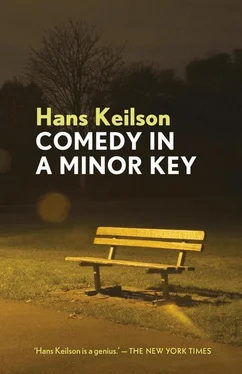Hans Keilson
Comedy in a Minor Key
For Leo and Suus, in Delft
“There they are again,” the doctor said suddenly, and he stood up. Unexpectedly, like his words, the noise of the approaching airplane motors slipped into the silence of the death chamber. He tilted his head to one side, squinted his eyes half shut, and listened.
As if a small generator hidden somewhere in the house had started and quickly revved up to full speed, the droning sound of the night squadron flying in grew stronger. It might also — or so it seemed at first — be coming from the basement, or from the house next door… But it was the night bombers making themselves heard, no doubt about it. In a wide formation they came from England over the beach that received the North Sea just a few miles away, shot out their flares to show the planes following behind them the flight path over Holland, and disappeared in the night across the eastern border. A few hours later they could be heard in another location, farther north or farther south, returning home, and then their noise grew fainter in the direction of the sea.
The man and woman standing indecisively near the bed, the way people stand when moved by fear and sadness at the same time, also looked up a little and listened.
“Already. So early,” the doctor whispered to no one in particular.
Wim looked sideways at him, confused, as though not sure what this comment referred to.
The first shots of the night — dull, thudding pops — were in curious contrast to the fine, almost musical sound of the airplanes. The windowpanes and doors shook and rattled, and the whole house, too lightly built, answered the explosions with a delicate, quick shudder. The beginning was always exciting, no matter how many times a person had already lived through it.
It was near the end of March and the days were getting longer again. When the doctor arrived, around seven o’clock, it was still light out.
Still, Marie had blacked out the windows in the room on the second floor, where “he” lived, as she had been doing for months. This involved a somewhat complicated system of cords and hooks. She preferred to do it herself because she was afraid that someone might see him from the street — a rather exaggerated concern, since there was no house opposite.
Their house stood on the western edge of the city, on a street of identically shaped new buildings — two rooms with a sliding door between them on the ground floor, three rooms and a bathroom upstairs, and an attic with a crawl space — across from a park. Past the park, the immeasurable west country, with its greenhouses and the pasturelands depopulated by the war, spread out all the way to the horizon, interrupted by canals and dams. Behind that was the mist of the sea. A silver seam out there, like glittering frost, held together the earth and the sky and the water.
This nightly ceremony of blacking out the windows belonged to a regimen of precautions that had moved into their house on the same day as the stranger. When the sickness came too, she performed these actions with even greater care, with a vague feeling that the sick man posed an even greater danger to them than someone healthy.
He had lain in bed for about two weeks. After a year of staying in this room day in and day out had driven the last emaciated traces of life from his face, the fever had given it back a certain color and curvature. In the final days, he spoke hardly a word. It was coming to an end.
When Marie turned on the light in his room in the evening, he still turned his face to the wall, an old habit. In the change from the dim outside light to the flat dull light of the electric bulb, his face appeared gray, like parchment. But his weakened body lay like a lump, motionless under the wool blanket. The lamp at half strength in the middle of the room cast more shadow than light.
Since he had gone into hiding in their house, they had screwed in a lower-watt bulb, to save money. And added a bluish cloth to the milky white lampshade to absorb more light.
Wim and Marie were not fearful people by nature. When they decided to hide someone in their house, they understood the risk they were taking on — to a certain extent, insofar as one can ever judge risk a priori. For risk falls under the category of Surprise, which is precisely what you can’t calculate in advance.
What if he suddenly got the idea to open the window himself during the day and stick his head out? Or turn on the light in the middle of the night, after taking down the blackout curtains? Not out of recklessness or to play a trick on them, but… You never knew, with a person in his situation, if he was about to do something stupid. No matter how you look at it, it’s no bed of roses to force yourself to sit alone in a room, for twelve months or often even longer, always with a certain danger in view, or to shuffle around the room — in felt slippers, of course.
Because for heaven’s sake, the cleaning lady who came for half a day twice a week, or the neighbors, could never know that someone was staying here on the second floor. Even if you could completely trust them, “Thank God.” Everyone on this street was “good.” And who knows if someone else in felt slippers wasn’t creeping around in one of these neighbors’ rooms too, preferring not to stick his nose outdoors during the day. Anyway, it was better not to talk about such things. There was so much gossip going around…
“No one can know, you hear? Only if we agree to that—” Marie had said, back then.
“Of course—” Wim answered calmly. “That’s obvious, no one. But you need to think it over carefully, there’ll be a lot of…”
“I’ve already thought it over,” countered Marie. He should have known that she never did anything without thinking it over. “No one, not even Coba.”
“Not even Coba, agreed,” Wim confirmed.
Coba was his sister. She lived nearby, in a suburb half an hour away by streetcar. The two women were very good friends, and Coba came by to see them so often that in the long run it was impossible to keep it a secret from her. And really, why keep it from Coba?… But Wim had said, “Agreed.” They would learn over time. And in the end, every situation conceals within itself certain unforeseen possibilities.
“And Erik?” Marie continued.
“Erik?” Wim asked, taken aback, and again: “Erik?” No question about it, she was nervous. The most nonsensical names were coming into her head. “What makes you think of him? For as long as we’ve been married, he… hold on…” He thought about it. “I think he’s been here once. There’s nothing to worry about with him… More likely when Mother comes; what then?”
Marie was startled. “I hadn’t thought of that…” She rubbed her head with both hands and then fixed her hair again, even though nothing needed fixing. “Yes… whenever we have any guests… How will Mother take it?”
“So you want to tell her?”
“When she stays with us, Wim — naturally I’ll tell her.”
“I’m not sure it is so natural,” Wim had said, and tugged his tie straight…
The first wave of airplanes was now flying over the row of houses.
All three of them stiffened in the same slightly hunched-over position — one never felt totally free. Their heads were tilted a little to one side. As the shots thudded at short intervals now, one after the other, their neck muscles twitched with the tension of listening and with the danger that was hurtling by over their heads, which made the whole house shake in unsteady expectation. The motors pounded powerfully. These artificial constructions of levers and corrugated metal, called to rigid-winged, brief life, filled the land and the sky with the rhythm of their iron pulse.
Читать дальше












